Education in The Gambia
Developing countries are struggling to lift themselves out of poverty, often for reasons beyond their control, but without educating their children this is almost impossible.
Education leads to opportunities in life for our sponsored children and their families. Your help and support really does make a difference.
Up to 15 years of education are available in Gambia. Primary level education is free and compulsory in The Gambia, but implementation of this is difficult. Secondary level education is not compulsory but is free up to a point.
The following is a breakdown of the type of education available:
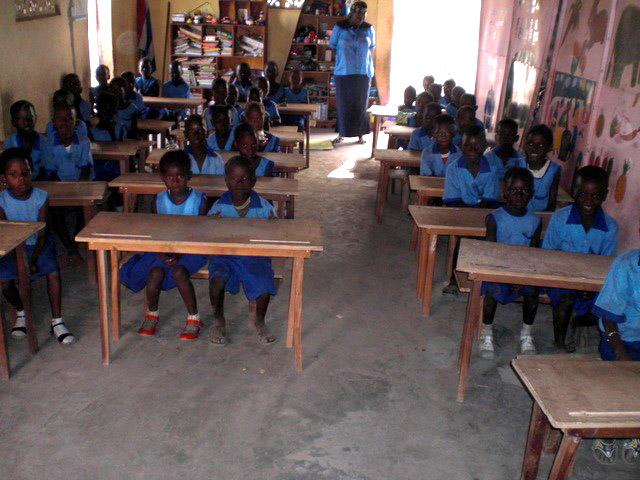
1.
3 years of nursery education, starting about age 4-5
2.
6 years of lower basic education (primary level, grade 1-6, from age 7)
3.
3 years of upper basic education (grade 7-9)
4.
3 years of senior secondary education (grade 10-12)
In rural areas children may start school at any age from 7 upwards, starting at grade 1 and progressing to the next grade each year.
There are no school fees for primary education, but parents are expected to provide uniform and stationery. UNICEF has provided support with this and the World Food Programme provides basics for a meal to be given to children in school which encourages attendance. Annabel has seen how attendance falls off when this is not provided and the food supply is exhausted.
At secondary level, which encompasses upper basic and senior secondary level, education is now free to encourage children to attend school, but they still have to provide equipment and uniform and buy books as well as pay an admission fee at senior secondary level.
The age range of students varies from about 12-24 at upper basic and senior secondary level.
This is because students might miss a year if they cannot afford their fees, or if they are not successful in yearly exams they may be asked to repeat the year. At the end of grade 9 students sit the Gambia Basic Education Certificate Examination and in grade 12 students sit exams which are standardised for West Africa (West African Senior School Certificate of Education).
After finishing secondary education students have the option to undertake vocational training or further education if it is affordable. Many will try to get voluntary work that they hope may lead to paid employment. Unfortunately many young people take ‘the back way’ to Europe due to lack of opportunity and jobs.
Schools in Bansang
There are several schools in and around Bansang, covering education from nursery level to senior secondary level: 1 senior secondary; 1 upper basic school; 3 basic cycle schools (grade 1-9); 7 lower basic schools, which also include nursery classes; and 2 nursery schools.
There has been a Senior Secondary School in Bansang since 2004. The school moved in October 2008 to a newly built site in Bantanto village about 1 mile from Bansang. Before this the school occupied the same building as the Bansang Upper Basic School. Children can continue their education at the senior school after finishing grade 9 at any of the Bansang Upper Basic, Sololo, Chargill or Jahanka Basic Cycle schools.
The Upper Basic Schools have 7 lower basic feeder schools, Bansang, Daru, Sukuta, Sare Gideh, Sare Kinteh, Dobang Kunda, Fuga and Mabali Kuta. Students from Fuga Lower Basic school move onto Sololo school. These also have nursery classes.
At nursery level there is Agape Nursery School and a Catholic Nursery School.
We occasionally send containers of equipment to the Bansang area, the last was in 2018. All schools in the area benefit from our shipments.
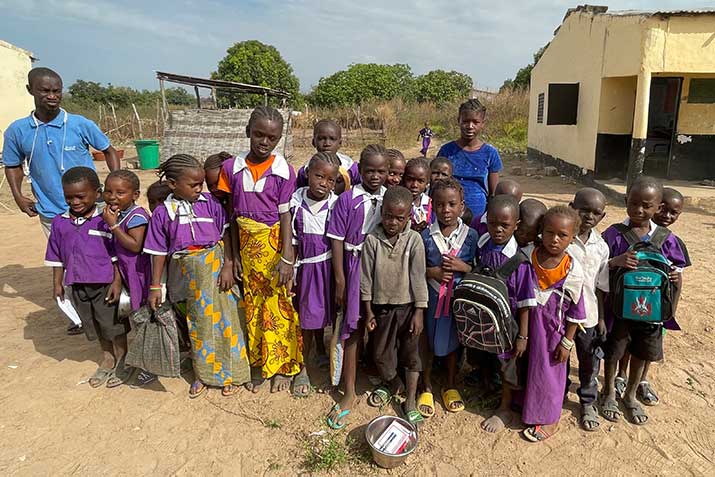
Fuga Lower Basic School
Fuga school is 1 km from Sololo school.
It was funded and built as a nursery by the village community to allow children in the village to access an early education. However the roof blew off two months after being put in place during the rainy season in 2011 and BEA was approached to see if it could help.
Having seen the commitment of teachers working for free with basic facilities we were glad to get involved. The school was given furniture provided by BEA sent in the container in 2014 as well as a secure roof and stationery.
The school came under government control in 2017 and opened as a Lower Basic school.
Sare Kinteh Lower Basic School
Lamin Touray is the principal at Sare Kinteh school. This school started as an annex of Mabali Kuta school to reduce the distance young children had to walk to school. Over a few years it became a school in its own right. It runs a double shift system like most schools in the area to accommodate pupils where classrooms or teachers are lacking. This means teachers work longs days from 7.45am through to 6pm.
Classrooms are basic but each has a blackboard and there are benches and tables for everyone. Children do not pay fees at this level of education but the Government is unable to provide more than teacher salaries, so teaching aids, exercise books, pencils and chalk are in short supply.
All schools have a hand water pump within its grounds so children can get drinking water. They also have small gardens where vegetables are grown to supplement rice cooked in the school kitchen. Teachers have a mixed education, with some holding the Primary Teacher’s qualification and some being untrained.
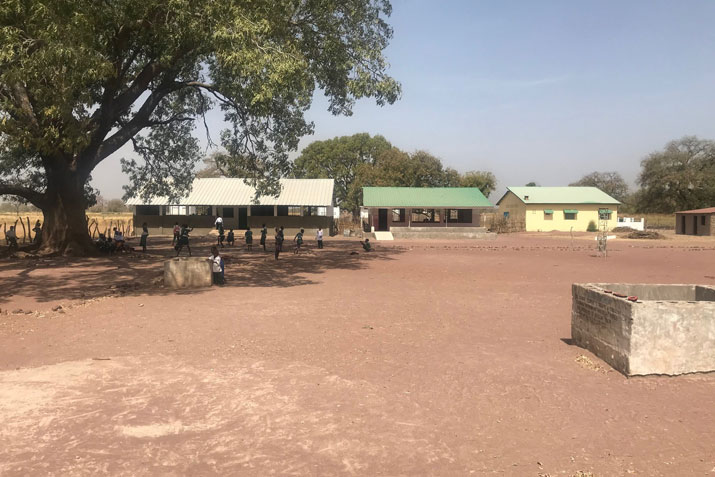
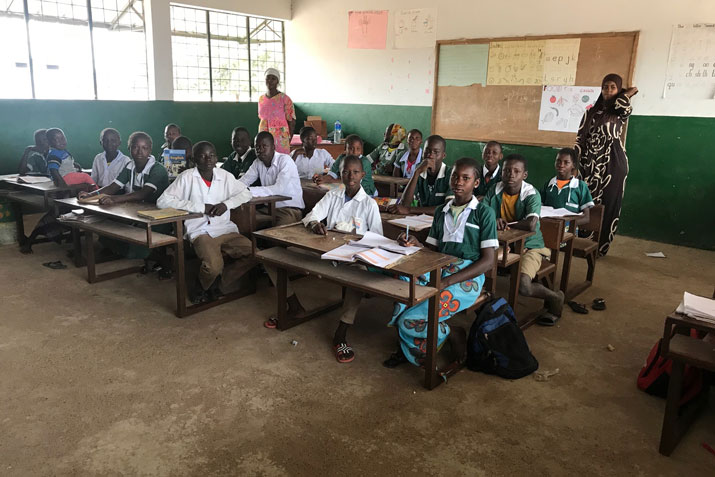
Sare Gideh Lower Basic School
This school also started life as an annex school, for Daru lower basic school, to increase availability of education for young children. Haruna Suwaneh is the principal. The school only has three classrooms so also runs a double shift system.
Dobang Kunda Lower Basic School
Sorry Manneh is the principal at this school which opened in 2013. It has around 450 pupils. Like most schools they run a double shift system as there are not enough classroom for all the pupils and runs a double shift system as there are not enough classroom for all the pupils.
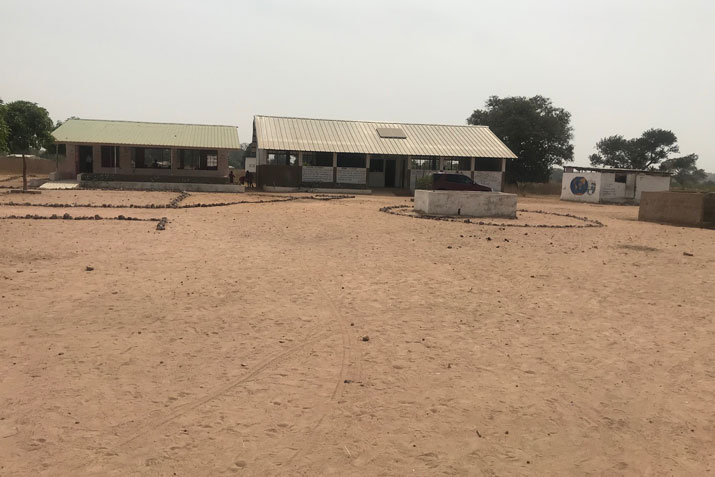
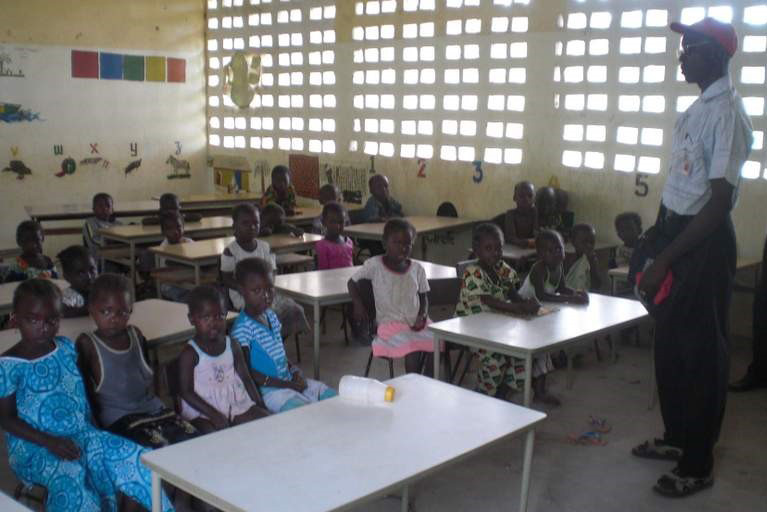
Mabali Kuta Lower Basic School
Mabali Kuta school is a few miles away from the main road close to the senior school.
The school has roughly 200 pupils. Many of the children have permission to attend without uniform as their parents are unable to afford the material and sewing costs (300 D (about £6)).
Classrooms are basic but each has a blackboard and there are benches and tables for everyone. Children do not pay fees at this level of education but the Government is unable to provide more than teacher salaries, so teaching aids, exercise books, pencils and chalk are in short supply.
There is a hand water pump within the school so children can get drinking water and they also have a small garden where vegetables are grown to supplement rice cooked in the school kitchen. Teachers have a mixed education, with some holding the Primary Teacher’s qualification and some being untrained. The principal is Amadou K Baldeh
Daru Lower Basic School
Daru school is 8km from Bansang and is headed by Mr Kanuteh, who was previously at Sukuta School
Daru has just under 300 children in grades 1-6 and nursery. The school also has an annexe school for nursery and primary 1 in a neighbouring village so that young children do not have to travel 4km on foot each way to reach school, this is now a school in its own right. The main school has 7 classrooms but 9 classes so like most other schools operates a double shift system, when some children attend in the morning and some in the afternoon. It is more difficult to learn in the afternoon due to the intense heat and no electricity to provide a way to cool down.
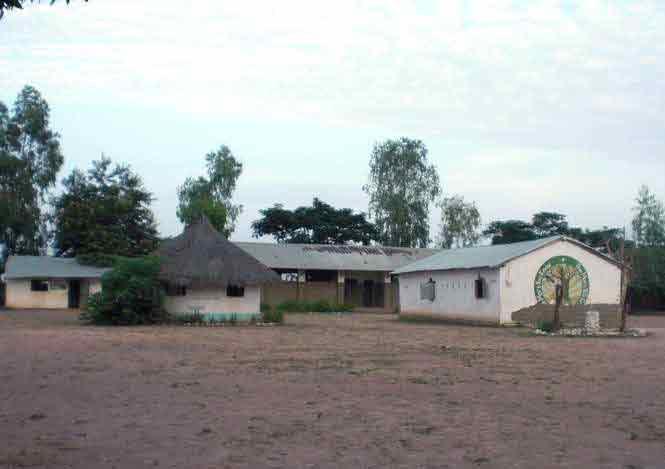
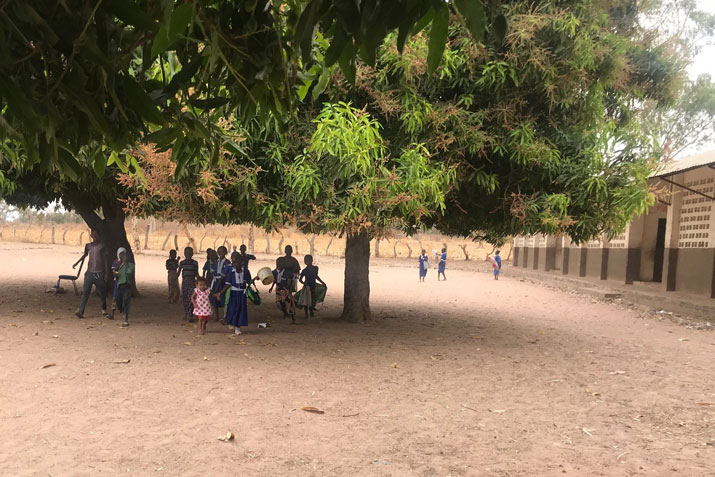
Sukuta Lower Basic School
This school is situated 12km from Bansang along unmade roads.
It is in a small village where the people live a subsistence life only making the four hour trek to the nearest shop if necessary. The head teacher is Mr Manneh, there are 6 teachers and 111 pupils. Everyone was very welcoming and the environment was clean.
BEA took over completion of the school kitchen at Sukuta, which had been started and left unfinished some years previously. It was in use by our last visit in 2020
Sololo Basic Cycle School
Sololo school is in a village a mile from Bansang. Basic cycle schools cover education from grades 1-9.
The school has 570 students in grades 1-6 and 250 in grades 7-9. Sololo school lacks furniture and had classrooms that couldn’t be used due to lack of roofs which had blown away in the strong winds of the rainy season. The roof was repaired in 2015 but furniture for the classrooms were still needed.
Most students at this school are from a farming background and it is common that only 1 or 2 children in a family will attend school. Many parents cannot afford basic uniform and equipment for school. Money raised by local Essex schools for BEA has provided exercise books and pencils for orphans in the school who struggle to get the financial support from extended family for these things. We also proved teaching aids and have funded the improvement of staff accommodation on site.
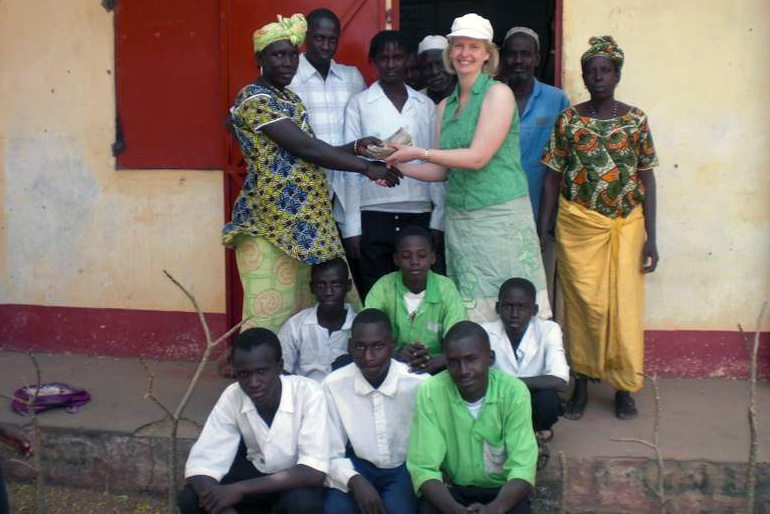
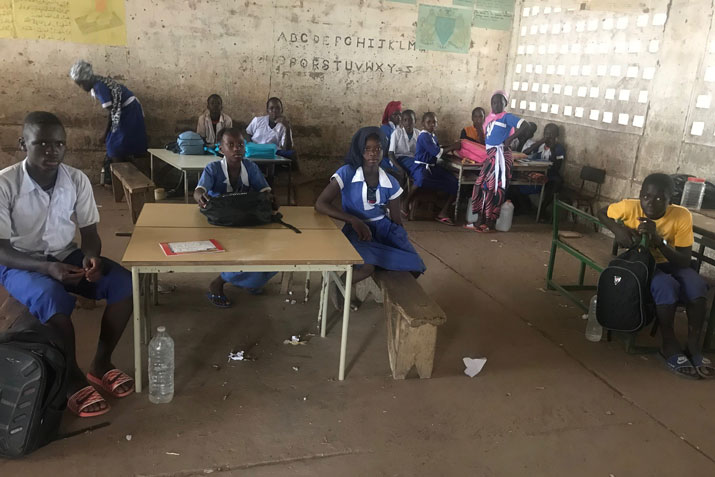
Chargel Basic Cycle School
Chargel School has split into 2 schools, a lower basic school and an upper basic/senior secondary school so pupils do not need to move away from their families to attend senior secondary education.
This School is quite a distance from Bansang off the main road. It is a large school serving the community around it but lacks many facilities. Previously it has been supported by provision of solar energy and computers, but both have fallen into a state of disrepair, as expertise on maintaining these is lacking locally.
Jahanka Basic Cycle School
Alhagie Fofana is the principal of this school which is situated 15 km from Bansang on unmade sandy and rocky roads.
It has been a lower basic school for some years but in 2012 became a basic cycle school so children can continue on with their education without having to travel to school or move to live in another town in order to attend school.
The current school building was built in 2008 along similar plans to the Bansang Senior School. Along with all village schools it has no running water or electricity.
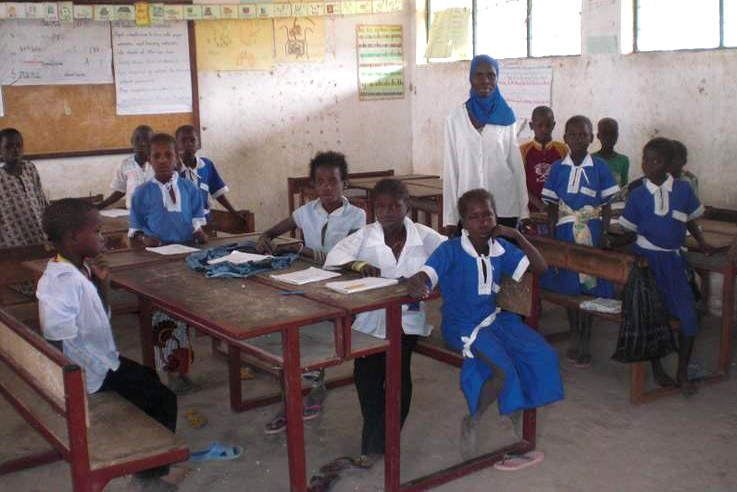
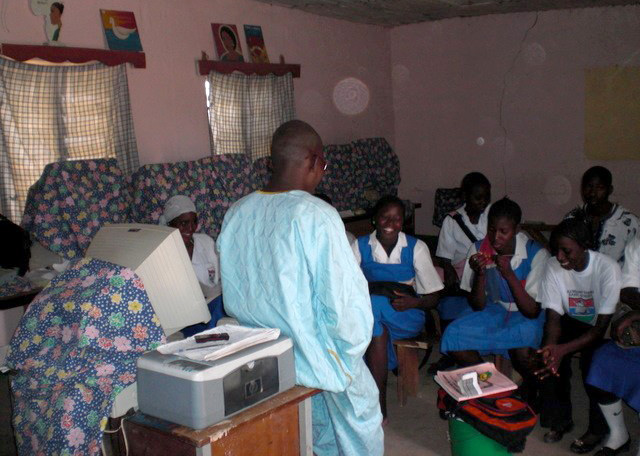
Bansang Upper Basic School
This school is located in Bansang Town and used to be the site of both the Senior Secondary and Upper Basic Schools until November 2008.
The day is divided into 2 shifts, morning from 7.30-1.15pm and 1.45-6.30pm. Teachers work both the morning and afternoon shifts. Grades 7-9 attend this school and take the exam at the end of grade 9. The current principal Lamin Sanyang. Since then the school is moving forward in many directions and BEA is pleased to work alongside the current management. The library and staff room were renovated in 2015 and work is in progress on the IT lab.
At the end of Grade 9 students take the Gambia Basic Education Certificate Exam.
Bansang Upper and Senior Secondary School
This school opened in 2004 on the same site as the BUBS and moved to its new site in the village of Bantanto in November 2008.
The current principal is Lamin Drammeh, who took over from Ismaila Ceesay, the founding principal, in October 2022. The school was initially for pupils at Grades 10-12 level, leading to the West African Senior Secondary School Certificate Exam. If students get good marks in this they may be able to go on to tertiary education if affordable. Students’ ages range from 15-24. Subjects are divided into streams: arts, science, commerce and technology and agricultural science.
The arts stream covers humanities subjects, commerce covers economics and accounting, science covers physics, chemistry and biology, technology covers metalwork, woodwork and home science. Maths, English, French and Islamic studies are core subjects.
Teachers at this school are the most qualified, most have the Advanced Teachers Certificate (ATC), some have been lucky enough to have attended degree courses at the University of The Gambia. Finding and retaining teachers in the provinces can be difficult and historically the school has been short of home science and physics/chemistry teachers. The school set up a Board of Governors giving it more autonomy which has helped recruit and retain teachers. BSSS divides its day into 2 shifts with half of grades 10 to 12 attending in the morning and the other half attending afternoon school, the classes are streamed.
There are over 1000 pupils in the school which has grown yearly and exceeds capacity it was built for.
The school management were not happy with the average academic standard of students starting at grade 10 so in ___ started their own upper basic school in 2019.
Although basic school fees are covered by the government it still costs £240 for a student to complete their education covering extra study fees, materials, excursions and if lunch is also included an additional £130 is needed.
BEA sponsors around 60 students a year.
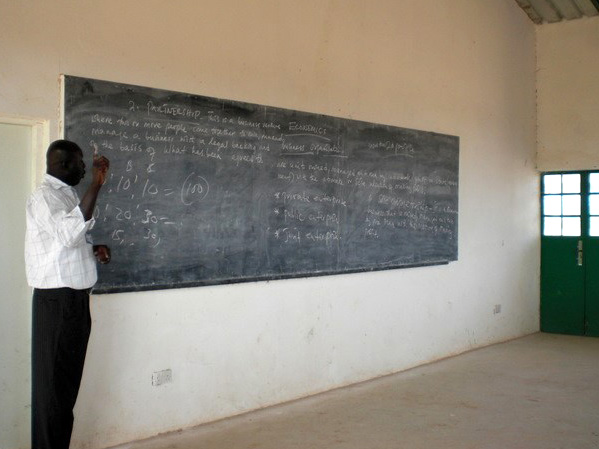
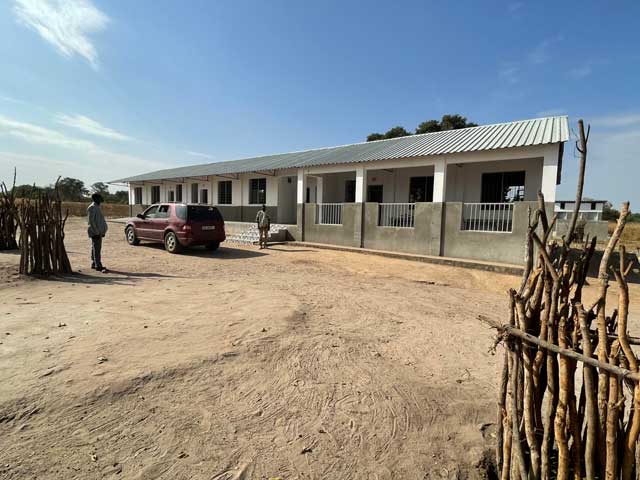
Futayel School
The principal is Mr Bah who was previously at Fuga.The school now has children to grade 5 and 6 teachers.
MRC Holland built 2 classrooms here, along with many more in the region. However as these are the only 2 classrooms, even following a double shift system some children study outside. The floors have been tiled so are much less dusty than most classrooms in the area. As a new school in a remote village materials are lacking. The women cooking lunch were bringing their own cooking pots from home as the school had none of their own.
SPONSOR | SUPPORT | DONATE
Bansang Educational Appeal raises money through regular giving, donations and fundraising events
